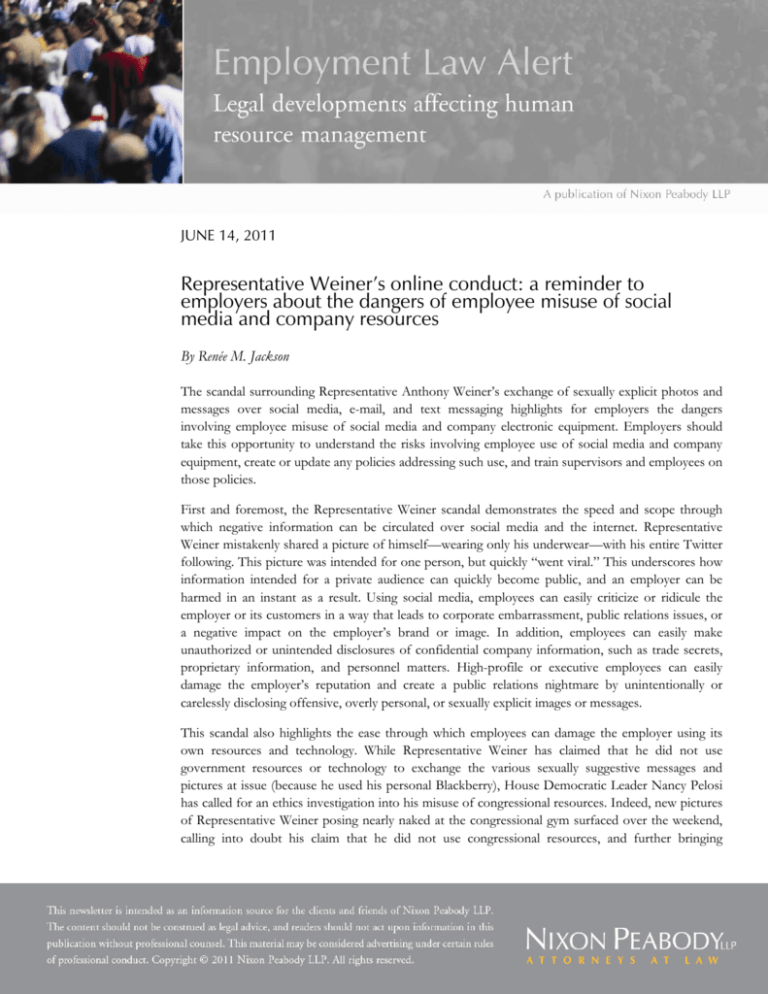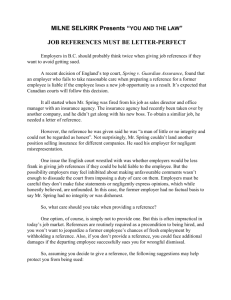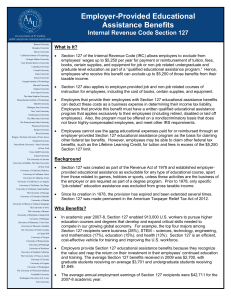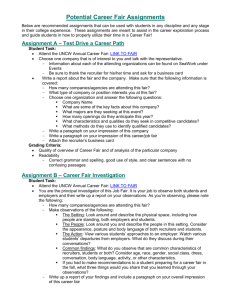Representative Weiner's online conduct: a
advertisement

JUNE 14, 2011 Representative Weiner’s online conduct: a reminder to employers about the dangers of employee misuse of social media and company resources By Renée M. Jackson The scandal surrounding Representative Anthony Weiner’s exchange of sexually explicit photos and messages over social media, e-mail, and text messaging highlights for employers the dangers involving employee misuse of social media and company electronic equipment. Employers should take this opportunity to understand the risks involving employee use of social media and company equipment, create or update any policies addressing such use, and train supervisors and employees on those policies. First and foremost, the Representative Weiner scandal demonstrates the speed and scope through which negative information can be circulated over social media and the internet. Representative Weiner mistakenly shared a picture of himself—wearing only his underwear—with his entire Twitter following. This picture was intended for one person, but quickly “went viral.” This underscores how information intended for a private audience can quickly become public, and an employer can be harmed in an instant as a result. Using social media, employees can easily criticize or ridicule the employer or its customers in a way that leads to corporate embarrassment, public relations issues, or a negative impact on the employer’s brand or image. In addition, employees can easily make unauthorized or unintended disclosures of confidential company information, such as trade secrets, proprietary information, and personnel matters. High-profile or executive employees can easily damage the employer’s reputation and create a public relations nightmare by unintentionally or carelessly disclosing offensive, overly personal, or sexually explicit images or messages. This scandal also highlights the ease through which employees can damage the employer using its own resources and technology. While Representative Weiner has claimed that he did not use government resources or technology to exchange the various sexually suggestive messages and pictures at issue (because he used his personal Blackberry), House Democratic Leader Nancy Pelosi has called for an ethics investigation into his misuse of congressional resources. Indeed, new pictures of Representative Weiner posing nearly naked at the congressional gym surfaced over the weekend, calling into doubt his claim that he did not use congressional resources, and further bringing Congress into a negative light. Regardless, this incident underscores an employer’s need to address employee misuse of company-issued technology, resources, and workspace. The “external disclosure” risk poses the greatest harm to employers, and is often the risk that employers are least prepared to deal with and address quickly. All employers should have a social media policy in place that covers such conduct and enables the employer to flexibly address any internal discipline that needs to be meted against the employee. All employees should be trained on the appropriate use of social media and all supervisors and human resources professionals should be trained on how to consistently apply, enforce, and report possible violations of the social media policy. Employers should make clear to employees that violation of the company’s social media policy or misuse of company equipment or technology is grounds for discipline, up to and including termination of employment. Employers should be prepared to launch an immediate investigation into misuse of social media or company resources, and into any underlying misconduct (e.g., sexual harassment, discrimination, retaliation, hostile work environment). Employers should also consider designating a “crisis” team or point-person to immediately address any external disclosure situations that might arise, so that a delayed response does not worsen the damage. This team or point-person could be prepared in advance to immediately respond to various external disclosure scenarios from a public relations standpoint. Employers should be sure to include in their technology and equipment policies a statement that employees “have no reasonable expectation of privacy” in any messages, texts, or images sent using company-issued technology or equipment. This will ensure that employers can use such messages, texts, or images in an internal investigation into misconduct (indeed, United State Supreme Court and New York State case law supports this proposition). Images of employees acting inappropriately in the workplace require additional internal considerations: social media policies should specifically prohibit posting of images depicting employees, customers, vendors, or business partners in the workplace or wearing company logos without written approval from a designated individual (marketing, human resources, or the like). The scandal surrounding Representative Anthony Weiner’s exchange of sexually explicit photos and messages over social media, e-mail, and text messaging sends a not-so-subtle reminder to employers that employees can easily and quickly damage the company using social media and, often, the company’s own equipment or resources. Employers should take the necessary steps to understand the risks surrounding employee misuse of social media and company equipment, create or update any policies addressing such use, train supervisors and employees on those policies, and be prepared to address—both internally and externally—any incidents of misuse. For more information, please contact your Nixon Peabody attorney or: Renée M. Jackson at 617-345-1028 or rjackson@nixonpeabody.com 2






